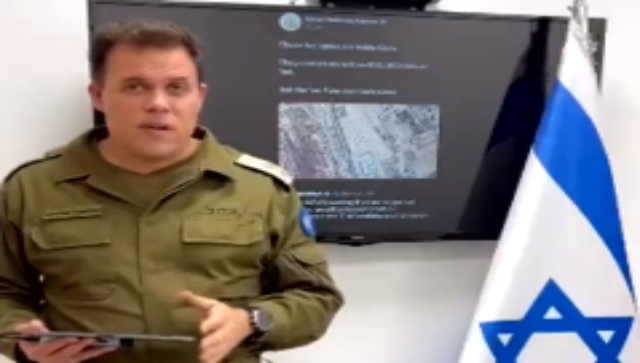Israel Defence Forces have claimed that Hamas, which governs the Gaza Strip, stores enough fuel to run hospitals and water pumps but the militant organisation’s priorities are different as it prefers to have all the fuel for its war-fighting capabilities, leaving civilians without it.
In a video message shared by ANI news agency on X, Israel Defence Forces (IDF) Spokesperson LTC Jonathan Conricus said, “Hamas which governs the Gaza Strip stores fuel - both diesel fuel, benzene and other types of fuel. It is all inside the Gaza Strip and there is enough for many days for hospitals and water pumps to run. Only the priorities are different. Hamas prefers to have all the fuel for its war-fighting capabilities, leaving civilians without it….” He said that international organisations ask for help but who are they asking from. “Are they asking Hamas who has the access to fuel and governs the Gaza Strip or are they blaming Israel, or asking Egypt. I think it’s very important that they point their questions and requests to the ones who can actually help them, and actually govern the Gaza Strip and that is Hamas,” added Conricus. Almost three weeks after the terror attack by Hamas militants against Israel sparked a wave of retaliatory airstrikes on the Gaza Strip, international humanitarian agencies are warning that the Palestinian territory is running out of critical and life-saving resources, especially fuel. Gaza, a narrow stretch of land along the Mediterranean Sea between Israel and Egypt, has been under an Israeli military blockade since Hamas took control of the enclave in 2007. Home to a densely packed population of about 2.3 million people, Gaza depends largely on Israel for drinking water, food supplies, electricity and fuel for its only power plant. In response to Hamas’s control, Israeli officials have limited the distribution of electricity and fuel to Gaza, citing concerns that these resources could be used to support the Hamas regime. Ongoing conflicts between Hamas and the Palestinian Authority, which governs the Israeli-occupied West Bank, have exacerbated the energy crisis in Gaza, according to the United Nations Office for the Coordination of Humanitarian Affairs. The recent escalation in violence in the region, with more than 1,400 people killed in Israel, primarily civilians, prompted Israeli Defence Minister Yoav Gallant to intensify the Gaza blockade. Gallant stated, “Nothing is allowed in or out, there will be no fuel, electricity, or food supplies.” However, over the weekend, twenty trucks carrying humanitarian aid, including drinking water and medical supplies, were permitted to enter Gaza via the Rafah crossing in Egypt, marking the first such allowance since the conflict began. Fuel remains in short supply, and the UN Relief and Works Agency for Palestine Refugees (UNRWA) warned that they would be unable to continue their operations in Gaza without it. The UN Secretary-General, Antonio Guterres, also stressed that without fuel, aid delivery, hospital operations, and water purification would be severely impacted. It’s estimated that Gaza requires approximately 160,000 liters (over 42,000 gallons) of fuel per day to meet its basic needs. The World Health Organization noted that a third of Gaza’s hospitals were no longer functional due to the fuel shortage, emphasising the enormous medical burden facing the territory under the Israeli military siege. While the WHO managed to deliver some fuel to major hospitals and ambulance services, it was only sufficient to keep them running for a little over 24 hours. Patients dependent on vital medical treatments, such as dialysis, neonatal care, and surgeries, are at risk if a stable supply of electricity is not maintained. The Israel Defence Forces spokesperson, Daniel Hagari, stated that fuel would not be provided to Gaza due to concerns that it could be seized by Hamas and used to support further violence. The claim that Hamas is stockpiling fuel in tanks inside Gaza and not distributing it to Palestinian civilians has not been independently verified.
The situation in Gaza remains complex, with humanitarian consequences resulting from the shortage of essential resources such as fuel, food, and electricity, affecting the lives of the people in the region. With inputs from agencies
)